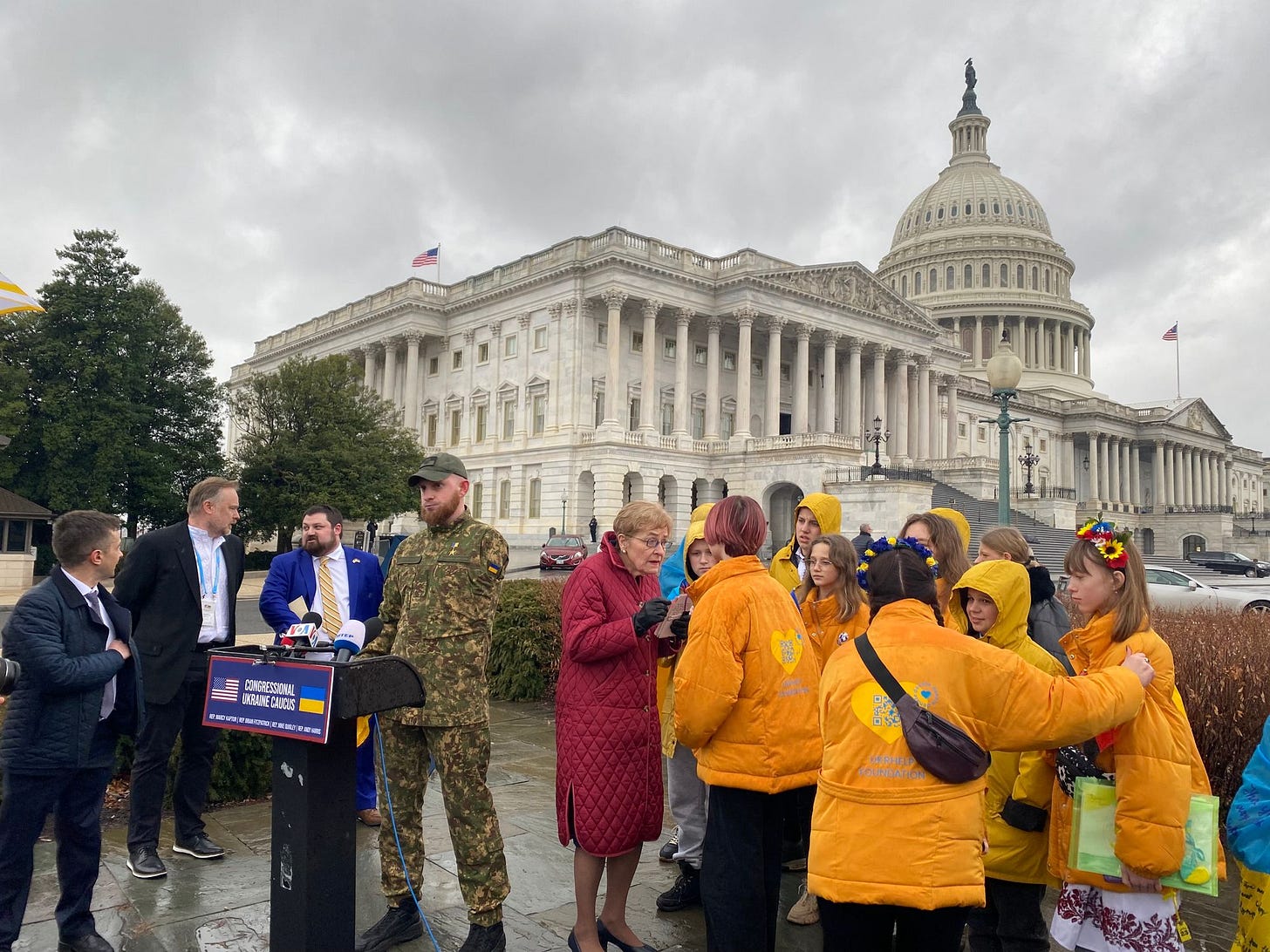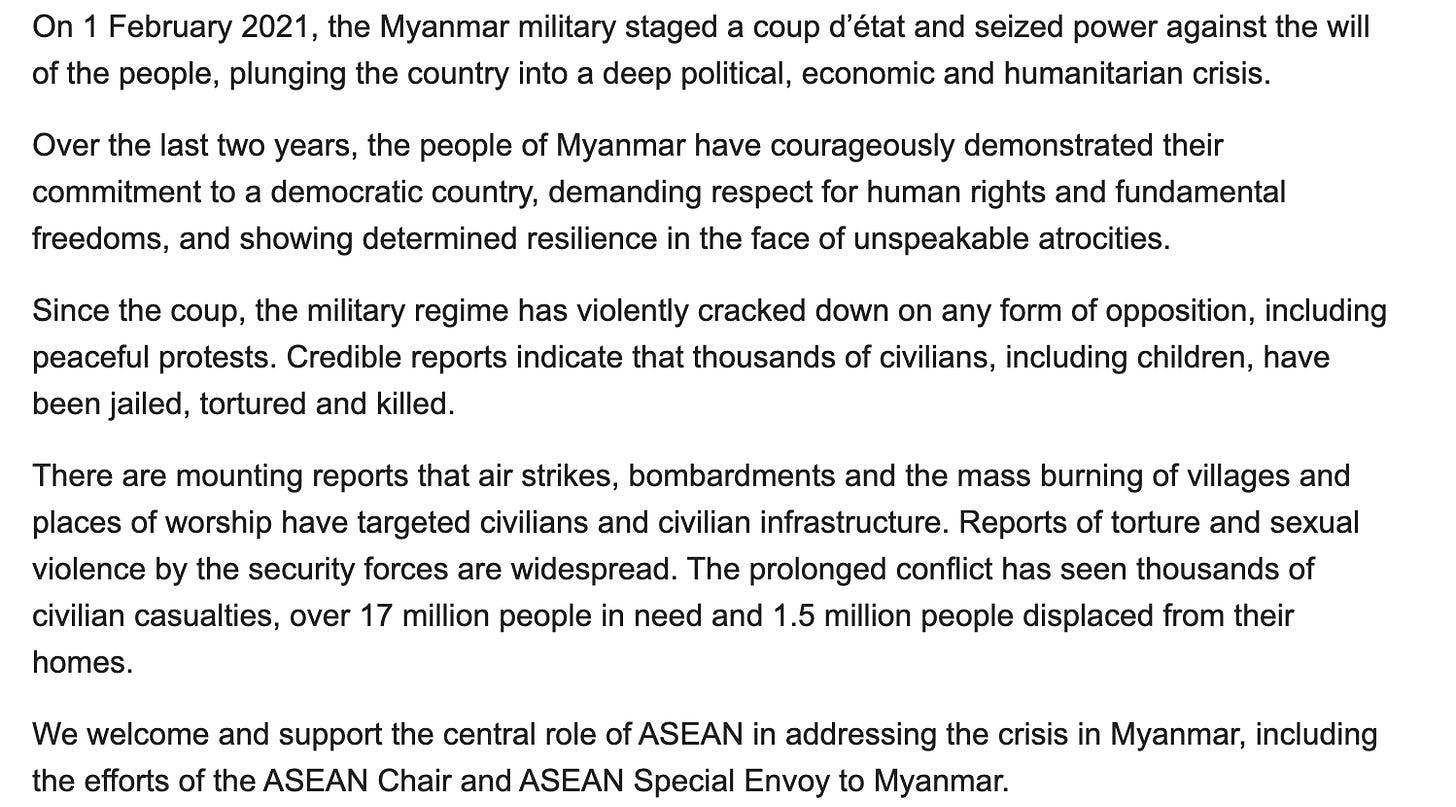Washington D.C. in action.
It was a busy week for foreign policy in Washington D.C. King Abdullah II of Jordan was on Capitol Hill, together with a delegation of around 40 Jordanians.
Former British Prime Minister Boris Johnson was also making the rounds, trying to gin up more support for Ukraine.
Democratic Senator Dick Durbin met with the Ukrainian Prosecutor General, presumably to discuss Judiciary Committee matters. Representatives Bill Keating, Joe Wilson, Marcy Kaptur, Brian Fitzpatrick, Mike Quigley, and Jim McGovern reintroduced legislation calling on President Biden to support an international tribunal to punish the crime of aggression against Ukraine.
Congressmen Wilson and Gerry Connolly, both senior members of the House Foreign Affairs Committee, reintroduced the Crimea Annexation Non-Recognition Act, which would prohibit any federal agency from taking action or extending any assistance that recognizes or implies recognition of Russia’s sovereignty over the Crimean Peninsula.
Lawmakers also met with all three presidents of Bosnia and Hercegovina. It was the first time the three appeared together in Washington in almost two decades.
A bipartisan group of senators urged President Biden to delay the sale of F-16 fighter jets to Turkey until Ankara approves Sweden and Finland’s admission to NATO.
Žygimantas Pavilionis, chair of the Lithuanian Foreign Affairs Committee, Radoslaw Fogiel, chair of the Polish Foreign Affairs Committee, and Oleksandr Merezhko, Chair of the Ukrainian Committee on Foreign Policy and Interparliamentary Cooperation, were in town talking to everyone.
The U.S. announced two packages totaling $2.17 billion in new military assistance to Ukraine.
In other words, Washington is back in action. What should I write about? There's honestly too much to choose from. I'll share a few of my photos from the week instead.
What I'm writing:
• No War Fatigue Here. U.S. lawmakers pledged unending support for Ukraine during a meeting with Ukrainian orphans and wounded veterans on Capitol Hill.
“We represent both parties, and we share an undying love and respect for our friends and allies in Ukraine,” said Rep. Brian Fitzpatrick, a Republican member of the Congressional Ukraine Caucus. “We are going to stay for as long as it takes … to continue to advocate that not only Congress but this administration [does] everything we can to make sure Ukraine is made whole. And that is to reconstitute the original Ukrainian borders, to push Russia out completely.”
• Eastern European leaders, visiting Washington this week, are throwing their weight behind Ukraine's accelerated NATO membership ahead of a summit in Lithuania this summer.
NEW: Eastern European leaders are throwing their weight behind Ukraine's accelerated NATO membership ahead of a summit in Lithuania this summer.
But U.S. lawmakers are more hesitant. A brief 🧵https://t.co/TPLRuVbKlm— Cristina Maza (@CrisLeeMaza) February 3, 2023
What I'm reading:
🇪🇺🇺🇦 We have never been closer.
Today we agreed to integrate Ukraine further into our Single Market and include it in key EU programmes.
We are also working on extending tariff-free access to our market and free roaming. https://t.co/iwkc1wd4xR— Ursula von der Leyen (@vonderleyen) February 2, 2023
•A large social network that promotes anti-Western and pro-Kremlin ideas is helping Russia expand its influence in Africa, the BBC reports. Called Russosphère, the site accuses France of modern-day "colonialism", eulogizes Vladimir Putin, and calls the Ukrainian army "Nazis" and "Satanists."
• The next round of U.S. military aid to Ukraine will include longer-range smart bombs for the first time, the Wall Street Journal reports. The package comes as the U.S. and its allies move to provide advanced weaponry to Ukraine ahead of an expected Russian offensive later this month.
• Ukraine’s defense minister told CNN that Kyiv believes Russia will mark the first anniversary of its invasion with a renewed offensive.
• Ukrainian authorities launched criminal cases against six former defense-ministry officials. The accusations against the officials range from misuse of funds to embezzling and accepting bribes. The Wall Street Journal has the story.
• The Czech Republic elected Petr Pavel, a retired senior NATO general, president. Pavel defeated billionaire populist Andrej Babiš by the most significant margin in the country’s history, the Guardian reports.
• Croatia's president said that Russian-annexed Crimea would never rejoin Ukraine, breaking from NATO, Business Insider reports. Zoran Milanović added that more Western-supplied weapons would only "prolong the war."
• Croatia's President Milanović - who has often crossed swords with his own government - has been added to a Ukrainian website listing Ukraine's enemies following his latest pro-Russian outbursts, Balkan Insight reports.
• Bulgarian President Rumen Radev dissolved the national parliament and called for an early general election on April 2, Politico Europe reports.
• Read Majda Ruge's take on the Western approach to Serbia for the European Council on Foreign Relations:
The European Union and the United States pursue four broad foreign policy objectives in their relations with Serbia: contain Russia, contain China, normalise Serbia-Kosovo relations, and protect the sovereignty of Bosnia and Herzegovina. However, for many years now they have achieved little success on any of these matters. Several reasons explain this, some lying within Serbia and some within Western capitals. EU and US policymakers could change this dynamic, but it appears unlikely they will do so.
• Writing for The American Prospect, Luke Cooper outlines how the death of Yugoslavian founder Josip Broz Tito precipitated a peacetime financial crisis, one where international aid came premised on drastic restructuring. The Balkan breakup is used to demonstrate what Cooper fears could happen in Ukraine.
• “As Ukrainian flags fly across European capitals and Western tanks come to Ukraine’s rescue, Hungary’s prime minister Viktor Orbán is openly questioning Ukraine’s viability as a sovereign state,” Lili Bayer reports for Politico Europe. In Budapest, his government has lined the streets with anti-sanctions billboards. The Hungarian State Opera is staging a production of Sergei Prokofiev’s “War and Peace.”
• Viktor Orbán’s Hungarian government adopted a law that allows the defense minister to fire anyone in the military aged over 45. The opposition says the government is undertaking a purge and stuffing the top ranks with those loyal to Orbán, who also share his pro-Russia views. The Financial Times has the story.
• Hungary has replaced Bulgaria as the European Union member state perceived to be the most corrupt, according to Transparency International. Bloomberg has the story.
• Orbán says he's taking a page out of Azerbaijan's authoritarian president's playbook:
Viktor Orban to Azerbaijan dictator Ilham Aliyev: “Over the last ten or more years I have learnt a lot from President Aliyev about how to run a country well in a complicated environment.” pic.twitter.com/FvRPqapOds
— Shaun Walker (@shaunwalker7) January 31, 2023
• Rovnag Abdullayev headed Azerbaijan’s state oil company, SOCAR, where he made a modest official salary until last year. Yet his son Rashad purchased an ultra-expensive property in London’s Grosvenor Square at the age of 25. The Organized Crime and Corruption Reporting Project has the story.
• An estimated half a million workers across multiple sectors in the United Kingdom went on strike in the biggest industrial action Great Britain has seen in more than a decade, CBS News reports.
• Seven journalists in Uzbekistan have been arrested on extortion charges in the biggest raid targeting media workers since President Shavkat Mirziyoyev took office in 2016, Eurasianet reports.
• For PRI the World, Levi Bridges spoke with queer Russians in Bishkek, Kyrgyzstan, who fled Russia’s draft.
• Officials from India’s ruling party say Twitter complied with the Indian government’s demands to remove a documentary critical of the regime. The Intercept has a petition calling on Elon Musk to stop silencing journalists on Twitter and restore access to the BBC’s documentary.
•The Myanmar junta’s defense ministry was invited to a five-day regional meeting and table-top exercise on maritime security co-hosted by Thailand and the United States next month, Myanmar Now reported.
• The United States said it will boost its military presence in the Philippines after Manila agreed to give the U.S. access to four additional bases as it seeks to counter China's aggression in the region, Axios reports.
• Israel’s attorney-general warned Israeli prime minister Benjamin Netanyahu not to get involved in a controversial overhaul of the country’s judiciary due to a conflict of interest stemming from his ongoing corruption trial, the Financial Times reports.
• Five social media content creators were arrested in Egypt after publishing a widely viewed spoof sketch about a visit to an Egyptian jail, Al Jazeera reports.
• Kenya is asking the U.S. to pay for the expansion of a joint counterterrorism base, raising concerns that the country could turn to China for help if the U.S. refuses. The Wall Street Journal has the story.
What the State Department says:
You can write to me for any reason at: c.maza@protonmail.com.








